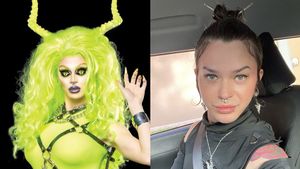Tanya Saracho wanted to make an impossible television show. Her prime-time debut, Vida, for which she is the creator and showrunner, was pitched as the story of two Latinx sisters finding out, that their mother, recently deceased, was in a lesbian relationship. But Mom wasn't the only queer in the family. The show would center multiple (read: not just one or two) queer women of color. And these women, queer and straight, would be complex, have storylines that didn't revolve around men, and be permitted to be butch, as well as human, and flawed. They would have very hot and hungry sex lives portrayed onscreen, with men, women, and nonbinary people. And they would vacillate between English, Spanish, and Spanglish in almost every scene -- without subtitles. To top it all off, every actor, writer, and crew member would be Latinx (and majority women and femmes, too).
These were all things TV executives in a boardroom might typically deem "impossible." And despite that impossibility, Saracho is now the first in mainstream television to have a show that does all these things at once. "I hope I'm not speaking too prematurely, but I think the tide is turning," says Saracho, who talks in a Tejano twang with sibilant Ss and Ts. This is coming from a woman who's been through the thick and thin of Hollywood. She paid her bills as a commercial voice-over actor and phone sex operator before booking her first "real TV job." On her first day there, a coworker said, "You know you're the diversity hire, right?"
Before Vida premiered on STARZ, Saracho was writing for the queer HBO show Looking, focusing predominantly on the Latinx character, Richie. (Fun fact: She's known Raul Castillo, the heartthrob who played him, since she was four. He was her first boyfriend.) When asked about why it's important for Latinx writers to create Latinx characters (ergo, why it's important for her to stack her cast and crew with femmes of color), she says, "You can just tell the difference." She cites little dramaturgical details, like the fact that Emma's fingernails are short so she can top her femme, another moment when a condom is placed over a vibrator, or another when a woman with a fluid sexuality is called "a tourist." "Things like that are just micro, but they become so macro," Saracho says. "That's life. That is vida."
COVER | Hari Nef Tommy Dorfman Are Living the Rom Com of Our Dreams
She needed the show to be of the queer imagination, rather than tokenization or caricaturization under the guise of "diversity." Take, for instance, her cinematographer, Ava Berkofsky, a queer woman who also works for HBO's Insecure.
She brings something to the show that can't be taught in film school: Vida's queer sex scenes feel not only safer, but more authentic. There is a "museum or safari quality" to the way these scenes appear when made by straight people, she says. With a show like Vida, "they're for our gaze, our g-a-z-e. It really made a difference having Ava there."
Saracho is a self-identified pocha, a term that describes a Mexican girl who has been culturally and lingually anglicized. "Pocha" is a term that comes up a few times in Vida to describe the two main sisters who have trouble relating to their Mexican peers because of their deeply American upbringing. This is also an experience Saracho shares with her characters.
"I feel very ni de aqui ni de alla," she says. Neither here nor there. "I've carried that border, that duality with me, because I'm not a full American." As an immigrant, Saracho is the product of two cultures: One that grounds her to her family and ancestry in Mexico, and another that links her to the country she lives in. But that liminal in-between space has created the inspiration for her resilient characters and show. "They can't deny us right now," she says. "We don't have it all, but we've gotten this much. We are undeniable. We are here."
For more profiles of our favorite Hollywood "scene stealers," check out:
To read more, grab your own copy of Out's February issue featuring Hari Nef and and Tommy Dorfman as the cover on Kindle, Nook and Zinio today, and on newsstands January 22. Preview more of the issue here. Get a year's subscription for $19.95.






































































